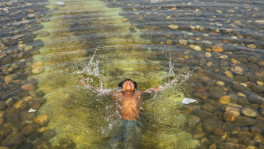WHO has 7-8 candidates for coronavirus vaccine
World leaders from 40 nations and organisations had pledged to contribute $8 billion for backing coronavirus testing, treatment and research

The World Health Organization (WHO) chief announced that they have seven to eight "top" candidates for a vaccine to combat the novel coronavirus, but their names have not been disclosed.
In a UN Economic and Social Council video briefing on Monday, WHO Director-General Tedros Adhanom Ghebreyesus said that the original thinking two months ago was that it may take 12 to 18 months for a vaccine. However, the situation has accelerated since then, after world leaders from 40 nations and organisations had pledged to contribute $8 billion for backing coronavirus testing, treatment and research, reports AP.
He said the $8 billion will not be enough, and additional funds will be needed to speed up the development of a vaccine, but more importantly to produce enough "to make sure that this vaccine reaches everyone (and) there's no one left behind."
"We have good candidates now," Tedros said. "The top ones are around seven, eight. But we have more than a hundred candidates." However, he did not disclose names of the top candidates.
Since January, Tedros said, "WHO has been working with thousands of researchers all over the world to accelerate and track vaccine development from developing animal models to clinical trial designs and everything in between. There is also a consortium of more than 400 scientists involved in vaccine development and diagnostics."
The WHO chief stressed that Covid-19 is "very contagious and it's a killer," with over 4 million cases now reported to WHO and almost 275,000 lives lost.
While new cases are declining in Western Europe, they are increasing in Eastern Europe, Africa, Southeast Asia, the eastern Mediterranean and other regions, he said.
Tedros said, "The pandemic is teaching us many painful lessons, especially the importance of having strong national and regional health systems. And yet on current trends, more than 5 billion people will not access these essential services by 2030- the ability to see a health worker, access essential medicine, and have running water in hospitals."
He stressed that as the response to Covid-19 continues, nations must also lay the foundations for a healthy, safer and fairer world.


 Keep updated, follow The Business Standard's Google news channel
Keep updated, follow The Business Standard's Google news channel















